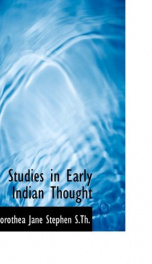studies in early indian thought

Purchase of this book includes free trial access to www.million-books.com where you can read more than a million books for free. This is an OCR edition with typos. Excerpt from book: CHAPTER III HUMAN NATURE IN THE UPANISHADS Our knowledge of everything outside ourselves depends, in the last resort, on our knowledge of ourselves. Therefore in forming an idea of the Great Self we should expect to begin by asking, What is man ? or What am I ? As a matter of fact this question is invariably left till the last. The first thought, whether of the child or of the race, turns outwards ; and we have eventually to revise the ideas already formed, when we have come to a slightly clearer conception of the haphazard way in which we have formed them. In the Vedas we find no questions asked about human nature. In the Upanishads it is looked at from five points of view:as being the reproduction of the divine nature ; as being the seat of desire, which is eventually to be either satisfied or destroyed; as controlled by caste, which fixes its condition in this life; as controlled by transmigration, which fixes its condition after death; and lastly as capable of salvation, which it hopes to attain in the end, and of sin, which hinders that salvation. HUMAN NATURE AS THE REPRODUCTION OF THE DIVINE Each man is the manifestation on a small scale of what is manifested on a large scale in the whole world. This idea is so frequent that almost any of the examples we have looked at already would do to show it. The human body acts as a kind oimem- oria technica, or rosary, by which to tabulate all existence ; either you explain the Great Self by the joints of the body, or you explain the joints of the body by the Great Self. When the world was made from the sacrifice of Purusha, each part of him became a part of it; and we find the same list of corresponding parts again and again. It seems that the mind of man cannot conceive of anything except in relation to itself; so each c... --This text refers to an alternate Paperback edition.
Info about the book
Author:
Series:
Unknown
ISBN:
1107605008
Rating:
5/5 (5)Your rating:
0/5
Languge:
English
Users who have this book
Users who want this book
What readers are saying
What do you think? Write your own comment on this book!
write a commentif you like studies in early indian thought try:
Other books by this author
Do you want to read a book that interests you? It’s EASY!
Create an account and send a request for reading to other users on the Webpage of the book!

